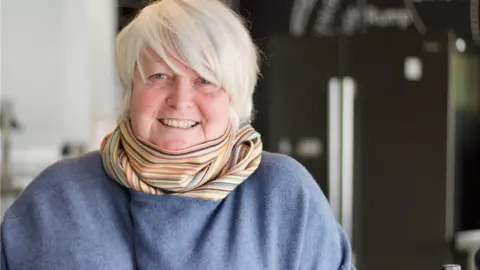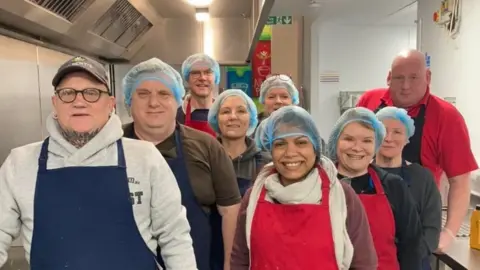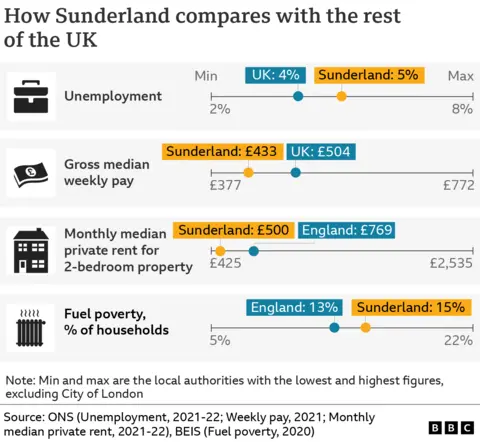'It used to be homeless people, now it's working people'
 BBC News
BBC News As part of its Counting the Cost of Living series, BBC News will be asking people how they are coping - and revisiting them over the coming months.
Andrea Bell founded the Sunderland Community Soup Kitchen, in July 2019, to help people in need across her city.
To begin with, the kitchen mainly fed the homeless community. But now she says working adults and young families are asking her for help.

Every morning starts like this, I'm on the phone speaking to all our volunteers about what they're going to be doing that day. It's always busy. I've not had a day off for seven weeks.
We offer people freshly cooked meals for free, four days a week, from our city centre kitchen - but in the three years since we opened, what we do has grown massively.
Now we also help people with furniture, clothing, shoes, tents and sleeping bags, and gas and electricity costs.
On the days we're doing hot food the team get into the kitchen at 11:00 BST to get ready for service at 15:00. I call it 'mam food', things like mince and dumplings or lasagne.
When I first told people I was going to open a soup kitchen, there were some who said Sunderland didn't need it because there weren't any homeless people. Yet the first night we opened we had more than 60 hungry people lined up before we even opened the shutters. We've been feeding people ever since.
 Sunderland Community Soup Kitchen
Sunderland Community Soup Kitchen Today we had 66 through the doors but a few Wednesdays ago we had 165 in one day. To be honest, I'd open the doors for one person.
A lot of food banks and other places have criteria for who they help, but we don't. The way I see it, if somebody's going to stand in a queue of nearly 100 people, they're hungry. We're not going to scrutinise why you're standing there.
The cost of living crisis is hitting places like Sunderland really hard and we're seeing a change in who is coming to us for help.
It used to be mainly homeless people and single men on benefits but this last year we're seeing everyday working people coming through our doors.
A woman came in the other week crying her eyes out, ashamed because she couldn't put food in her child's lunchboxes. She said, 'we've got a mortgage and two cars but there's been a change in one of our wages, we're up to our eyes in debt'.
For so many people it's just one slight change of circumstances and suddenly they're in crisis.

I had a pensioner call me over the weekend, a lovely lady, who just said 'Andrea I can't make ends meet, can you help me?'
Sometimes people come to us as they've just lost their job or maybe they're waiting for their benefits to be set up.
I like to say we're giving people pride, dignity and hope. That's why we make sure to make healthy food and provide fresh fruit and veg.
The first time I cried doing this was seeing someone sucking a carton of orange juice like it was the best thing ever.
The cost of living crisis is hitting us as an organisation as well. We rely on donations but we're £30,000 down on donations compared to this time last year.

Counting the cost of living
Read our reports from other places in the UK.

When we go to the wholesaler, meat and bread are at least twice as expensive and our energy bill is three times what it was, so we're having to scrimp a bit.
We're making the food from our allotments stretch further, we're switching off lights, working to minimise fuel costs and trying to save every penny we've got. We're asking for donations of food instead of money so we can get it to people quicker.
This winter is going to be really hard for many people in Sunderland but the amazing team behind me keeps me motivated and positive. By the time the morning has started in the kitchen, everyone is fired up. People I'd never met are now better than friends.
I'm the only paid full-time member of staff but, even in the worst case scenario, I'll work for nothing and get a second job. I'll find a way, we'll never stop.
As told to NJ Convery
